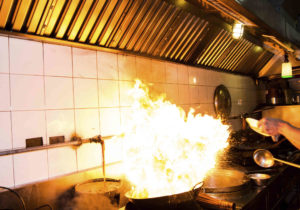
Any time you turn on the oven or light one of the burners on your stove, there is always a chance that a fire could start.
A house fire is a terrifying experience. Not surprisingly, most house fires start in the kitchen. Many people enjoy cooking a homemade meal, but many risks come with it. Any time you turn on the oven or light one of the burners on your stove, there is always a chance that a fire could start, which is why you need to be highly cautious when you are in the kitchen. Let’s go over some of the most common causes of kitchen fires.
High Cooking Temperatures
Some people think that the higher the temperature, the faster their food will cook. However, that is not the case. Setting the cooking temperature too high is a great way to light your food on fire. According to the National Fire Protection Association, food ignition is responsible for almost two-thirds of kitchen fires. Always set the temperature to what the recipe calls for; do not try to improvise or set the temperature higher just because you’re in a rush.
Leaving Food Unattended
Unattended cooking is the leading cause of most kitchen fires. Walking away while cooking, even for a moment, can easily become a hazardous situation. It is never a good idea to multi-task or walk around your house when cooking with an open flame or when the stove is set to a high temperature.
Hot Cooking Oil
When you fry or broil anything in oil, you must pay continuous attention to it. More than half of kitchen fires are started due to ignited cooking oil, fat, grease, butter, and other cooking substances. Oil spreads flames faster and can still cause a fire the next time someone cooks if there is some residue left on the stovetops.
Flammable Items Near Stove
It is convenient to have everything you need at arm’s reach when cooking, but too many objects near an open flame can be dangerous. Kitchens have plenty of flammable items, such as rags, napkins, paper towels, hand towels, wooden utensils, fabric oven mitts, or even your clothes. Make sure you store all flammable objects away from the stove where there are likely to be open flames.
How to Handle a Grease Fire
It is important to know how to suppress a kitchen fire if one ever happens. Grease fires are different from other fires and need to be dealt with immediately. Here are a few tips to follow in case of a grease fire:
- Remove the source of heat
- Cover the flames with a metal lid
- Pour baking soda over smaller grease fires
- Use a dry chemical fire extinguisher
- Evacuate and call 911
Commercial and Residential Fire Prevention from Judd Fire Protection
If you want to ensure your home and business are safe throughout the year, trust Judd Fire Protection, LLC. We have over two decades of experience in designing, installing, inspecting, and repairing residential and commercial fire protection systems. We serve clients throughout Maryland, Pennsylvania, Washington, D.C., Virginia, and West Virginia. If you are interested in finding out more about our services and protecting your home and business, give us a call at 410-871-3480 or contact us online. For more fire safety tips, follow us on Facebook, Twitter, and Pinterest.
